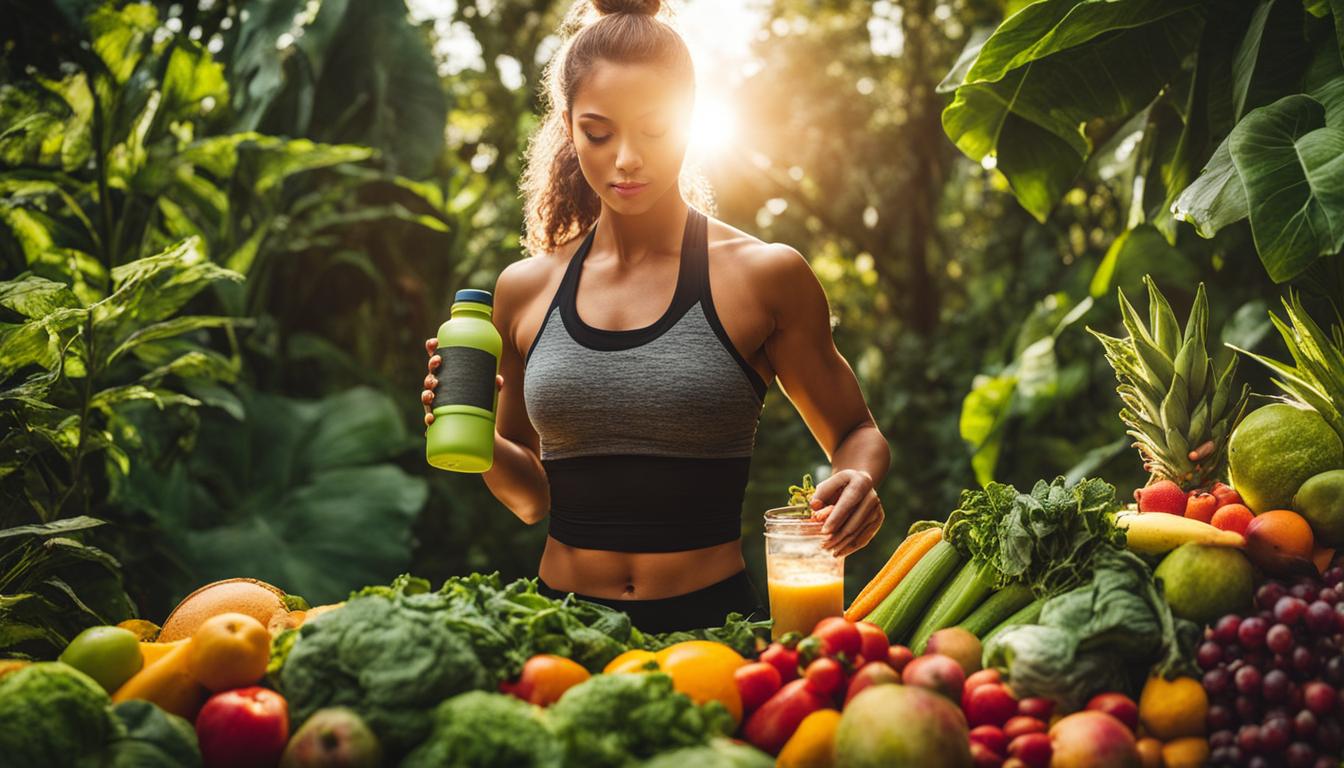Are you interested in vegan fitness? Wondering if it’s possible to build muscle on a plant-based diet? The answer is a resounding yes! With the right approach, you can achieve your muscle-building goals while following a vegan lifestyle. Contrary to popular belief, consuming plant-based protein can be just as effective as animal-based protein for muscle growth.
Protein is a crucial component for building muscles and overall health, and there are plenty of plant-based sources that provide ample protein. Foods like quinoa, tempeh, and hemp seeds are rich in protein and can fuel your muscle-building journey. By focusing on a balanced, plant-based diet and incorporating strength training exercises, you can build the strong, lean physique you desire.
Key Takeaways:
- Building muscle on a plant-based diet is possible with the right approach.
- Plant-based protein sources like quinoa, tempeh, and hemp seeds can provide ample protein for muscle growth.
- Incorporating strength training exercises is essential for building and toning muscles.
- A balanced, plant-based diet that includes a variety of nutrient-dense foods is key for vegan fitness.
- Vegan fitness offers numerous benefits for overall health and the environment.
The Importance of Protein for Building Muscle
Protein plays a crucial role in muscle growth and development. It provides the necessary building blocks for repairing and building muscle tissues. While animal-based protein sources are commonly associated with muscle building, plant-based diets can also provide ample protein for muscle growth.
Plant-based proteins may not contain all essential amino acids in the same quantities as animal proteins, but with a well-planned vegan diet, it is possible to obtain all the necessary amino acids for muscle growth. By incorporating a variety of plant-based protein sources such as beans, lentils, tofu, and quinoa into their meals, vegans can ensure they are meeting their protein needs.
“Protein is crucial for muscle growth as it provides the building blocks necessary for muscle repair and growth.”
It’s important to note that protein needs can vary depending on factors such as weight, activity level, and fitness goals. Therefore, it is essential for vegans to calculate their individual protein requirements and ensure they consume enough protein to support muscle growth and repair.
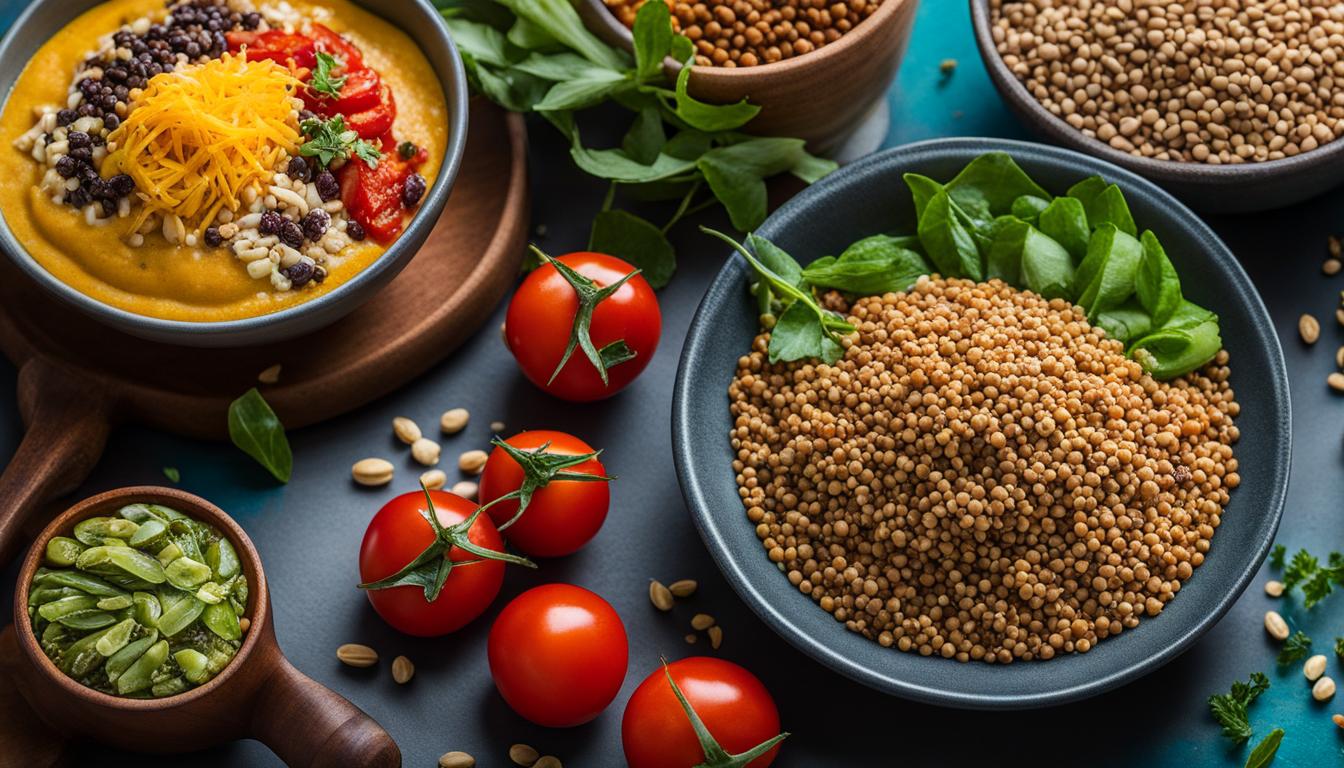
Vegan Protein Sources for Building Muscle
When it comes to building muscle on a plant-based diet, getting enough protein is essential. Fortunately, there are plenty of vegan protein sources that can help you meet your protein needs and support muscle growth. Here are some excellent options:
- Quinoa: This ancient grain is not only a great source of protein but also packed with essential amino acids. It can be used in various dishes and provides a hearty and nutritious base for meals.
- Lentils: These legumes are rich in protein, fiber, and iron. They are versatile and can be included in soups, stews, salads, or even used as a meat substitute in burgers and meatballs.
- Tofu: Made from soybeans, tofu is a popular plant-based protein source. It is high in protein and contains all nine essential amino acids. Tofu can be cooked in many ways and added to stir-fries, salads, or even blended into smoothies.
- Tempeh: Another soy-based product, tempeh, is a fermented form of soybeans. It has a firm texture and nutty flavor, making it a versatile ingredient in various dishes. Tempeh is a good source of protein and provides probiotics as well.
- Plant-based protein powders: For an easy and convenient way to boost your protein intake, consider using plant-based protein powders. These powders are typically made from sources like peas, brown rice, or hemp seeds and can be added to smoothies or used in baking.
The importance of meeting your protein intake
Protein is crucial for muscle building as it provides the necessary amino acids for muscle repair and growth. It’s important for vegans to ensure they are consuming enough protein to support their fitness goals.
Remember, everyone’s protein needs are different, so it’s essential to calculate your individual requirements based on factors like weight, activity level, and fitness goals. By incorporating a variety of plant-based protein sources into your meals and snacks throughout the day, you can ensure you are meeting your protein needs and supporting muscle building on a vegan diet.
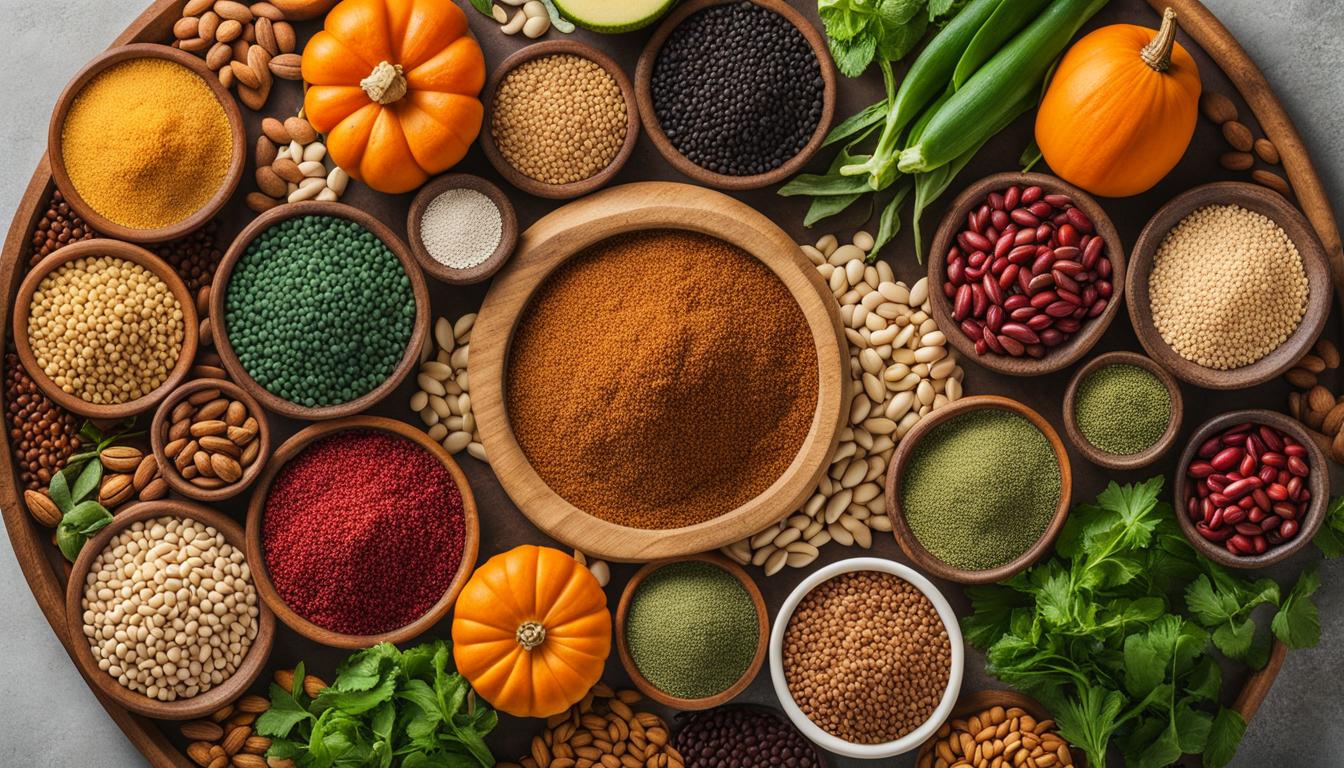
The Role of Carbohydrates in Building Muscle
Carbohydrates play a crucial role in building muscle on a vegan diet. They serve as the primary source of energy for the body, providing the fuel needed to power through workouts and support optimal performance. Complex carbohydrates, such as whole grains, fruits, and vegetables, are particularly beneficial as they digest slowly, providing a steady stream of energy throughout the day.
When carbohydrates are consumed, they are broken down into glucose, which is then stored in the muscles and liver as glycogen. During exercise, the body taps into these glycogen stores to fuel the muscles. Consuming enough carbohydrates ensures that glycogen stores are replenished, allowing for enhanced muscle recovery and growth.
Quote: “Carbohydrates are like gasoline for the muscles. Without sufficient carbs, your energy levels will suffer, and your muscle growth will be compromised.” – Vegan bodybuilder and fitness expert
The benefits of carbohydrates for muscle building:
- Provides the necessary energy for intense workouts
- Aids in muscle recovery and growth
- Supports optimal performance during training
- Helps maintain glycogen stores for sustained energy
Incorporating a variety of carbohydrate-rich foods into a vegan diet is essential for muscle building. Whole grains such as brown rice, quinoa, and oatmeal, along with fruits and vegetables, should make up a significant portion of meals. These foods not only provide carbohydrates but also offer a range of other nutrients that support overall health and well-being.
By prioritizing complex carbohydrates and balancing carbohydrate intake with protein consumption, vegans can optimize their muscle building efforts and achieve their fitness goals.
Building Muscle with Plant-Based Whole Foods
Eating a plant-based diet doesn’t mean sacrificing muscle growth. In fact, plant-based whole foods are excellent for building muscle and promoting overall health. By incorporating nutrient-dense foods into your diet, you can fuel your workouts, support muscle recovery, and achieve your fitness goals.
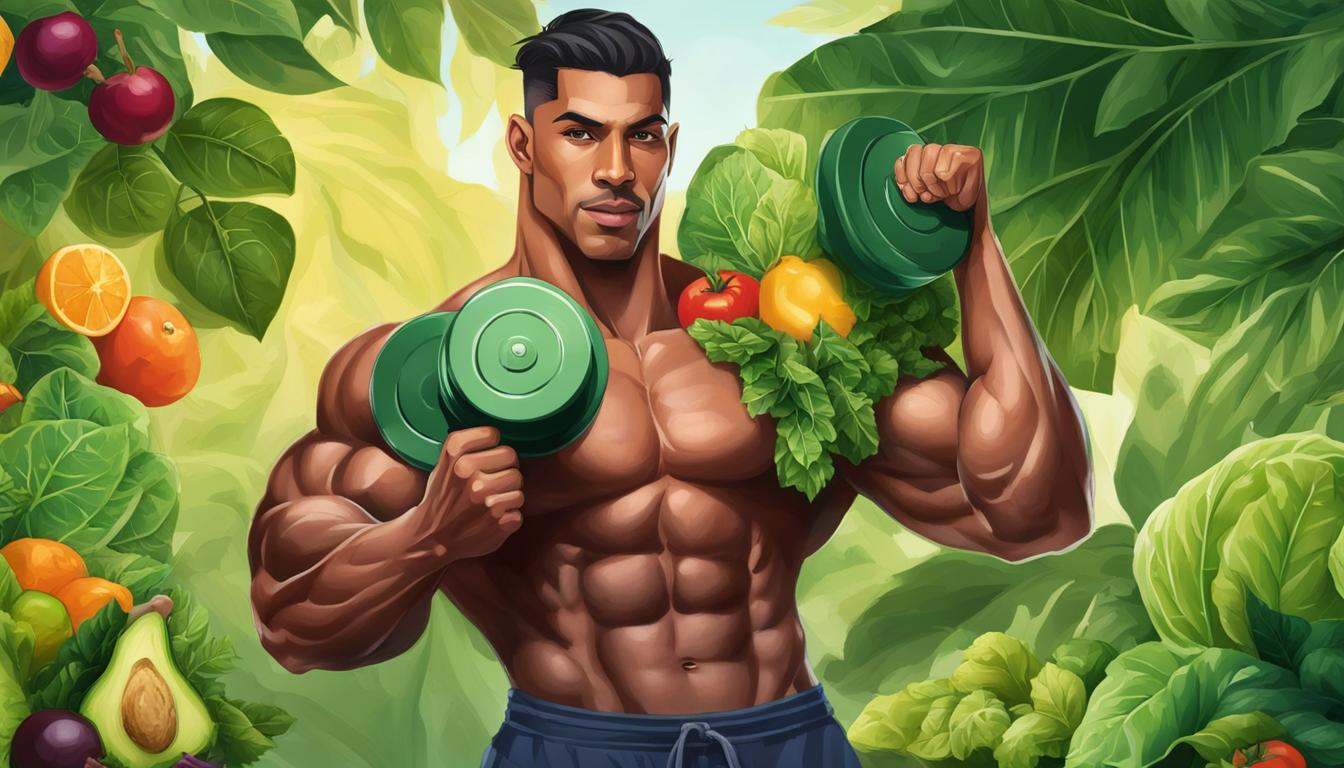
When it comes to muscle growth, protein is essential. Plant-based whole foods offer a wide range of protein sources that provide the necessary amino acids for muscle repair and growth. Foods like quinoa, lentils, tofu, and tempeh are rich in protein and can be easily incorporated into meals and snacks.
In addition to protein, plant-based whole foods are packed with essential vitamins, minerals, and antioxidants that support muscle recovery and overall health. Leafy greens, fruits, and vegetables are rich in nutrients that help reduce inflammation, enhance immune function, and promote optimal performance during workouts.
By embracing clean eating with plant-based whole foods, you can optimize your muscle building efforts while nourishing your body with the nutrients it needs for optimal health and performance. Combined with regular strength training exercises, a plant-based diet can help you achieve your desired muscle growth and maintain a fit and healthy lifestyle.
Vegan Protein Sources
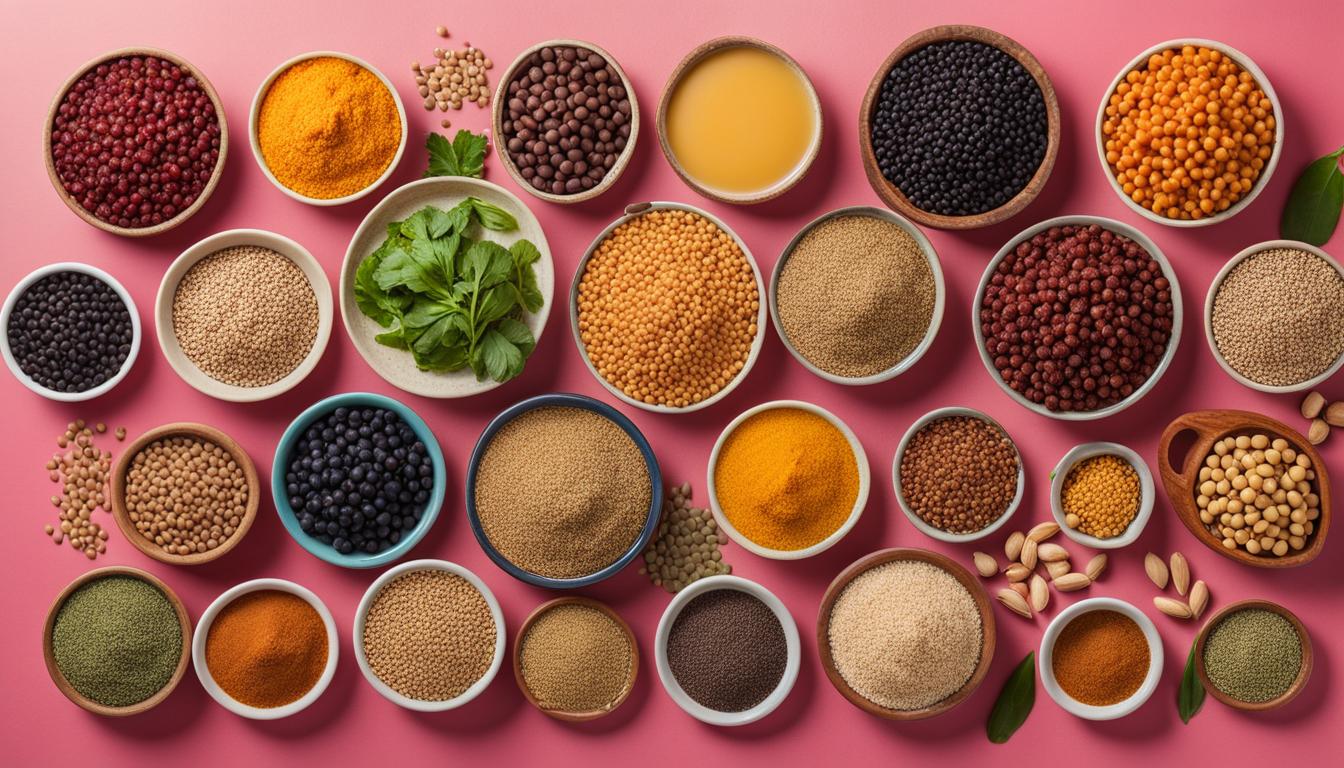
When it comes to building muscle on a plant-based diet, there are a plethora of vegan protein sources to choose from. These sources provide essential amino acids and are rich in protein, making them ideal for muscle building. By incorporating a variety of plant-based protein sources into meals and snacks, vegans can ensure they are meeting their protein requirements.
1. Quinoa
Quinoa is a complete protein source, meaning it contains all nine essential amino acids. It is also high in fiber and rich in other nutrients like iron and magnesium. Adding quinoa to salads, stir-fries, or using it as a side dish can boost your protein intake.
2. Lentils
Lentils are not only an excellent source of protein but also a great source of fiber and complex carbohydrates. They are versatile and can be incorporated into soups, stews, curries, and salads. Lentils come in various colors, including green, red, and black, providing different flavors and textures.
- Green lentils hold their shape well and are perfect for salads and side dishes.
- Red lentils are quick-cooking and can be used in soups, stews, and curries.
- Black lentils, also known as Beluga lentils, have a firm texture and are ideal for salads and hearty dishes.
3. Tofu and Tempeh
Tofu and tempeh are popular plant-based protein sources for vegans. Tofu is made from soybeans and has a mild taste and a versatile texture, making it suitable for various dishes. Tempeh is a fermented soybean product with a slightly nutty flavor and a firmer texture. Both tofu and tempeh can be marinated, grilled, stir-fried, or used in salads and sandwiches.
In addition to these examples, there are other vegan protein sources such as chia seeds, hemp seeds, and plant-based protein powders. Including a variety of these protein-rich foods in your diet will help you meet your protein requirements and support muscle growth on a plant-based diet.
The Benefits of a Plant-Based Diet for Muscle Building
Following a plant-based diet for muscle building offers numerous benefits. Not only is it a more sustainable and environmentally friendly option, but it also provides a wide range of health advantages. Plant-based diets are typically low in saturated fat and high in unsaturated fats, which are beneficial for heart health. They are also rich in antioxidants and phytochemicals, which help fight inflammation and reduce the risk of chronic diseases.
In addition to these health benefits, a plant-based diet can support muscle growth and fitness goals. Plant-based foods such as legumes, tofu, tempeh, and quinoa are excellent sources of protein, essential for muscle building. These foods also provide important nutrients like iron, calcium, and vitamins, which are necessary for overall health and optimal muscle function.
Furthermore, a plant-based diet can help maintain a healthy weight and body composition, as it is generally lower in calories and higher in fiber. This can promote better digestion, reduce the risk of obesity, and support overall energy levels. By adopting a plant-based diet for muscle building, individuals can improve their health, enhance athletic performance, and minimize their impact on the environment.
Fitness Tips for Plant-Based Muscle Building
- Focus on consuming a variety of plant-based protein sources such as legumes, tofu, tempeh, and quinoa to ensure adequate protein intake for muscle growth.
- Incorporate strength training exercises into your workout routine to stimulate muscle growth and development.
- Stay hydrated by drinking plenty of water throughout the day to support muscle function and recovery.
- Consume enough calories to meet your energy needs and support muscle growth, but maintain a balanced diet to avoid excess weight gain.
- Give your body enough rest and recovery time to allow muscles to repair and grow.
A plant-based diet can be a powerful tool for muscle building and overall fitness. By focusing on nutrient-dense whole foods, adequate protein intake, and incorporating regular strength training exercises, individuals can achieve their muscle building goals while reaping the benefits of a plant-based lifestyle. It’s a win-win for both personal health and the planet.
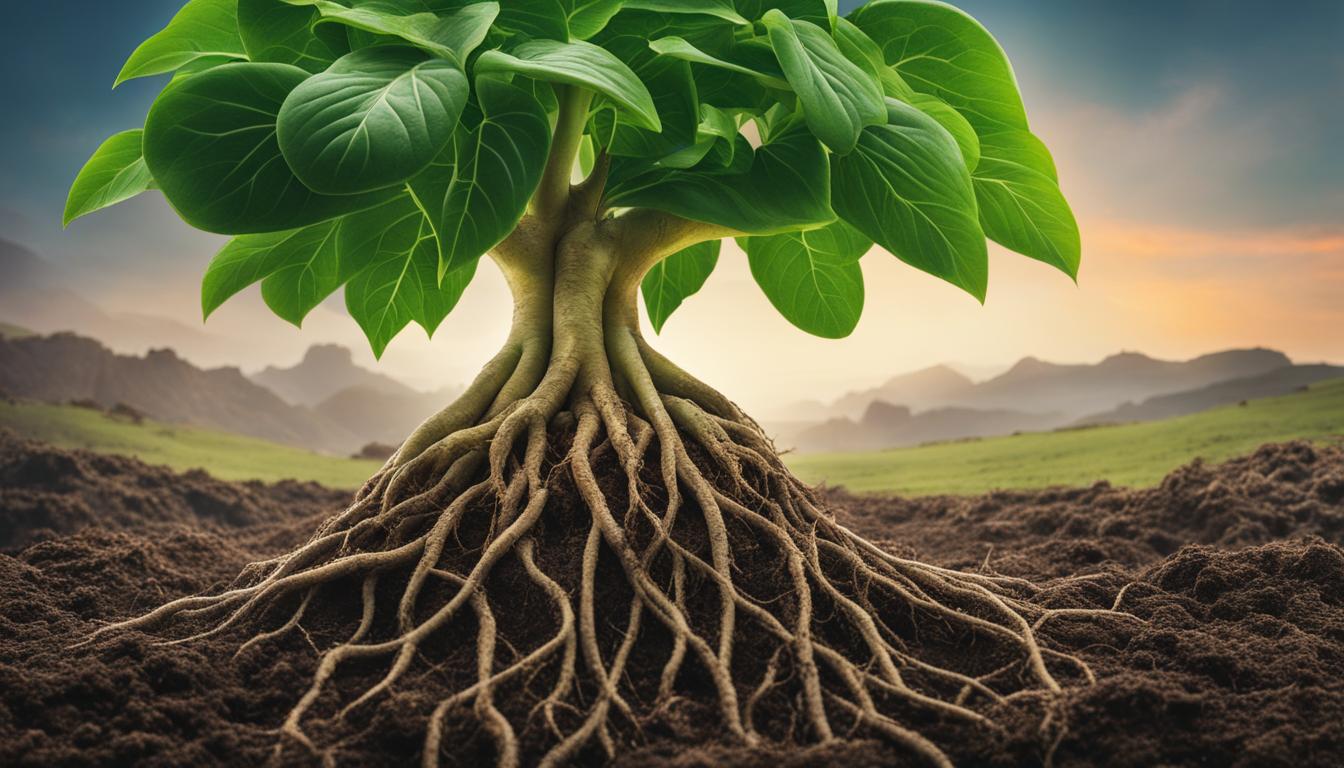
Tips for Vegan Muscle Building
Building muscle on a plant-based diet requires a strategic approach. Here are some essential tips to help vegans maximize their muscle-building potential:
- Ensure adequate protein intake: Protein is crucial for muscle growth and repair. Incorporate a variety of plant-based protein sources into your meals, such as lentils, tofu, quinoa, and tempeh. Plant-based protein powders and bars can also be convenient options.
- Incorporate strength training exercises: Engage in regular resistance training workouts to stimulate muscle growth. Focus on compound exercises that target multiple muscle groups, such as squats, deadlifts, and bench presses.
- Stay hydrated: Water is essential for muscle function and recovery. Aim to drink enough fluids throughout the day to maintain optimal hydration levels.
- Consume enough calories: To support muscle growth, you need to consume a calorie surplus. Calculate your daily caloric needs and ensure you are eating enough to fuel your workouts and support muscle recovery.
- Get enough rest and recovery: Adequate rest is crucial for muscle growth. Allow your body enough time to recover between workouts, and prioritize quality sleep to support optimal muscle repair.
Tracking progress and adjusting:
Tracking your progress is essential in your muscle building journey. Monitor your strength gains, body measurements, and overall performance. If you’re not seeing the desired progress, assess your diet and exercise regimen and make necessary adjustments. Consulting a registered dietitian or nutritionist who specializes in plant-based diets can provide valuable guidance.
By following these tips, vegans can optimize their muscle-building efforts and work towards achieving their fitness goals. Remember, consistency and dedication are key to long-term success in vegan bodybuilding.
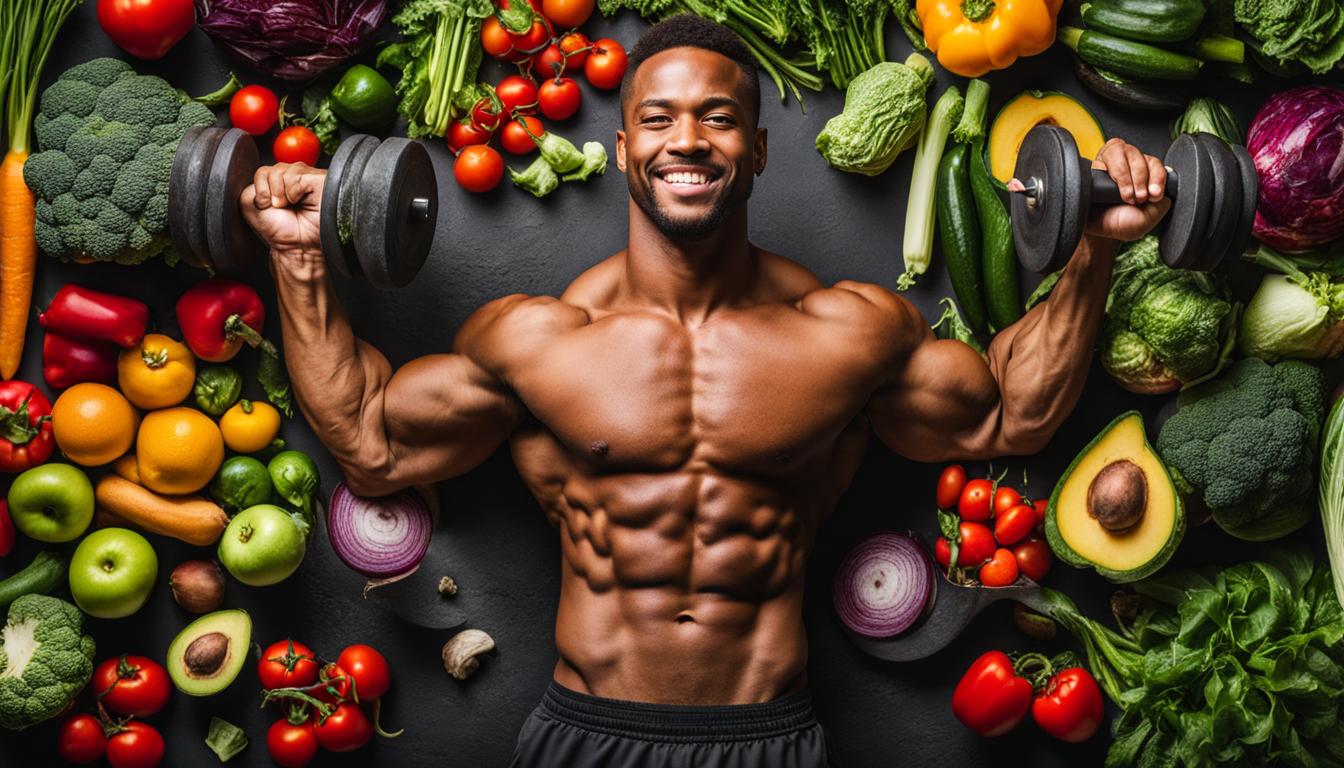
Challenges of Vegan Bodybuilding
Vegan bodybuilding offers unique challenges that athletes must navigate to achieve their fitness goals. One of the main challenges is ensuring adequate protein intake. Although plant-based protein sources are plentiful, it can be challenging to consume enough protein to support muscle growth, especially for individuals with high protein requirements. To overcome this challenge, vegans can incorporate protein-rich foods such as tofu, tempeh, and lentils into their meals and consider using plant-based protein powders or supplements.
Meeting increased calorie needs is another hurdle for vegan bodybuilders. Building muscle requires a surplus of calories, and it can be challenging to consume enough plant-based food to meet these calorie demands. Vegans can address this challenge by incorporating calorie-dense foods like nuts, seeds, avocados, and coconut oil into their diet. Additionally, tracking calorie intake and adjusting portion sizes accordingly can help ensure sufficient energy for muscle building.
Nutrient deficiencies are also a potential concern for vegan bodybuilders. Certain nutrients, such as vitamin B12, iron, omega-3 fatty acids, and zinc, are commonly found in animal products and may require careful attention on a plant-based diet. Vegans can overcome this challenge by incorporating fortified foods or supplements into their diet and regularly monitoring their nutrient levels through blood tests. Consulting a registered dietitian or nutritionist who specializes in plant-based diets can provide valuable guidance and help identify any nutrient gaps.
Vegan Fitness Success Stories
Plant-based athletes have been proving time and time again that a vegan diet can support muscle building and athletic performance. These inspiring success stories challenge the notion that animal products are necessary for achieving remarkable results in fitness.
Leading the Way: Venus Williams
“Going vegan is the best decision I’ve ever made. I feel stronger, more vibrant, and it has had a positive impact on my performance on and off the court.” – Venus Williams
Venus Williams, a professional tennis player and seven-time Grand Slam singles champion, adopted a plant-based diet to improve her health and performance on the court. With a focus on whole foods and plant-based protein sources, Williams has thrived as a vegan athlete, proving that a plant-powered diet is all one needs to excel in their sport.
Defying Stereotypes: Cam Newton
“My body just feels regenerated. I don’t think I’m going to look back.” – Cam Newton
Cam Newton, an NFL quarterback, embraced a plant-based lifestyle to enhance his athletic performance and recovery. Despite common misconceptions about veganism and muscle building, Newton has defied stereotypes and achieved impressive physical feats by fueling his body with plant-based nutrition.
Setting Records: Patrik Baboumian
“I’m not only stronger than I’ve ever been, but I’m also healthier than I’ve ever been. It feels like I’ve turned back the biological clock.” – Patrik Baboumian
With multiple world records in strength-based competitions, Patrik Baboumian is a living testament to the power of a plant-based diet for building muscle. As a former vegetarian turned vegan, Baboumian has overcome challenges and surpassed expectations, showcasing the potential of plant-based nutrition in athletic performance.
Conclusion
Building muscle on a plant-based diet is not only possible, but it also offers numerous benefits for overall health and the environment. By focusing on adequate protein intake, consuming nutrient-dense whole foods, and incorporating strength training exercises, vegans can achieve their fitness goals while staying true to their values.
Protein is crucial for muscle growth, and plant-based sources such as quinoa, tofu, and lentils provide ample protein to support muscle building. While animal products contain all essential amino acids, a well-planned vegan diet can also provide all the necessary amino acids in different combinations.
Following a plant-based diet for muscle building offers various benefits, including decreased saturated fat intake, increased consumption of antioxidants and phytochemicals, and positive impacts on the environment. Vegan athletes like Venus Williams, Cam Newton, and Patrik Baboumian have shown that plant-based diets can support muscle growth and athletic performance, inspiring others to embrace vegan fitness and challenge the notion that animal products are necessary for success.
With the right approach and dedication, vegan fitness can lead to remarkable results. So, whether you’re a long-time vegan or considering adopting a plant-based diet, know that you can build muscle, improve your health, and make a positive impact on the world.
FAQ
Is it possible to build muscle on a plant-based diet?
Yes, building muscle on a plant-based diet is possible with the right approach. Consuming plant-based protein can be just as effective as animal-based protein for muscle growth.
What role does protein play in muscle building?
Protein is crucial for muscle growth as it provides the building blocks necessary for muscle repair and growth. Plant-based sources such as quinoa, tempeh, and hemp seeds provide ample protein for muscle building.
How can vegans meet their protein needs?
Vegans can meet their protein needs by incorporating a variety of plant-based protein sources such as beans, lentils, tofu, and quinoa into their meals. Plant-based protein powders and bars can also be useful for reaching protein goals.
What role do carbohydrates play in muscle building?
Carbohydrates are essential for fueling muscles during workouts and providing energy for overall performance. Complex carbs, such as whole grains, fruits, and vegetables, should make up the majority of a vegan diet.
What foods should vegans focus on for muscle building?
Vegans should focus on whole, nutrient-dense foods such as quinoa, brown rice, legumes, leafy greens, and a variety of fruits and vegetables. Eating clean, whole foods supports overall health and aids in muscle recovery and growth.
What are some plant-based protein sources for vegans?
Plant-based protein sources for vegans include quinoa, lentils, tofu, tempeh, chia seeds, hemp seeds, and plant-based protein powders. These foods provide essential amino acids and are rich in protein, making them ideal for muscle building.
What are the benefits of a plant-based diet for muscle building?
Plant-based diets are typically low in saturated fat, high in unsaturated fats, rich in antioxidants, and have a smaller environmental footprint. By adopting a plant-based diet for muscle building, individuals can improve their health while also reducing their impact on the environment.
What tips can help vegans with muscle building?
Some tips for vegans with muscle building include ensuring adequate protein intake, incorporating strength training exercises, staying hydrated, consuming enough calories, and getting enough rest and recovery time.
What challenges do vegan bodybuilders face?
Vegan bodybuilders may face challenges such as ensuring adequate protein intake, meeting increased calorie needs, and addressing nutrient deficiencies. However, these challenges can be overcome by planning meals carefully, choosing nutrient-dense foods, and considering supplements if necessary.
Are there success stories of vegan bodybuilders?
Yes, there are many success stories of individuals who have achieved significant muscle growth and strength on a vegan diet. Examples include Venus Williams, Cam Newton, and Patrik Baboumian.

